All Hands on Deck, World Environment Day 2020 – Humanity at the Crossroads
Human civilization has been put on notice. And the fundamental issue of our time is the climate crisis. This climate emergency integrates so many of our present-day concerns with issues of economic sustainability, energy production, and social responsibility We are literally at crossroads.
We need to seriously reflect on our systems of social, political, and economic choices and how best we are responding to the enormous problems that have been and continue to be created by this climate crisis?
We cannot limit ourselves to a single solution if we are to avert this climate crisis. It will require the rigor of scholarly input, a sober analysis of our environmental bodies, a strong political will but most important of all, a massive resounding and civic awakening in response to this monumental challenge. As the voices of global environmentalists develop a consensus on clean energy resources, countries like Uganda are just getting excited about the discovery of oil as an economic saviour. Therefore, a variation of solutions needs to be tabled on how to effectively respond, how to transform our organizational setup, recognizing the need for new ecocultural collaborations, recognizing interspecies codependency, and frankly, spiritual awakening to the dire fate of our "Common home."
Specific to Uganda, among many solutions, and in response to this crisis, is the awakening of not only the youth but also children as spirited activists in this effort. A lot more needs to be done to bolster the civic imperative of non-government actors in the pursuit of a better, cleaner, and sustainable environment.
As the world continues to get ravaged by the COVID-19 pandemic, we still have to maintain some semblance of civility and order. 5th June will see humanity celebrate World Environment Day with a call to humanity to respect Nature and its Biodiversity.
With a constant concerted push to keep fossil fuels in the ground, advocacy for alternative renewable sources of energy, and the urgent need to beat plastic pollution as well as plant more trees humanity needs to step up her efforts with precision and diligence. Without this concerted effort, locusts and rising water levels from our lakes and rivers will be the least of our worries.
For this reason, Uganda’s Little Hands Go Green in partnership with 350Africa.org, NEMA Uganda, the National Forestry Authority Uganda and the Deputy Speaker of Parliament in Uganda is hosting a candid virtual workshop about Nature and Biodiversity and our role as the human race to ensure it is preserved on June 05th.

This online conversation will start at 2.30 pm East African time and will be streamed live on various social media pages including the 350Africa Facebook page, Uganda’s Little Hands Go Green Facebook and Twitter handles as well as the NEMA Uganda pages.
Join us and let’s share our voice of change and reason with the very custodians of our environment.
By Joseph Masembe, founder and team leader of Little Hands Go Green.
Ugandan communities concerned over oil’s deal amid COVID-19 crisis
The Government of Uganda has applauded the recent agreement that will see Tullow Oil Plc transferring its assets for Lake Albert Development project and the proposed East African Crude Oil Pipeline System to Total Uganda at $575 million (Sh57.5 billion).
According to the Minister of Energy and Mineral Development, “it is a critical development that takes the (Oil and Gas) sector towards the Final Investment Decision (FID) that the country is eagerly waiting for”.
That joy isn’t however shared with communities in Western parts of Uganda. They are deeply concerned that if the Ugandan government allows the presence of oil activities in the eco-sensitive areas such as the Ngaji block which have been put up for bidding to the investors, their lives will be ruined because they have depended on the tourism for their livelihood which will disappear.
If the government allows the oil exploration in the Ngaji oil block, which is located in the ecosensitive Lake Edward and Queen Elizabeth National Park (QENP), this seriously will put such sensitive ecosystems at risk, triggering the slow but certain disappearance of the rich ecological, economic and social importance of such ecosystems. Agriculture, fisheries, tourism, and other income-generating activities for local communities are also likely to be negatively impacted.
Communities and activists are also worried about oil exploitation activities will also result in the generation and release of greenhouse gas emissions into the atmosphere, which goes against the 2015 Paris Climate Change Agreement ratified by Uganda.
As the world is going through a terrible situation of preventing and ending global coronavirus pandemic, Uganda, like all other signatories to the Paris Agreement should be more concerned about a Just Recovery Plan that focuses on health emergencies, addresses the urgent needs of people and support public health systems currently under severe strain. As of April 26th, the country has a total number of 75 COVID-19 confirmed cases.
By Edwin Mumbere - Kasese
Defending the Defenders
Last week Ugandan environmental defenders working around issues of environment and extractives met in Kampala for a 5-day workshop on risk assessment and security planning. The workshop was organized by Defend Defenders.
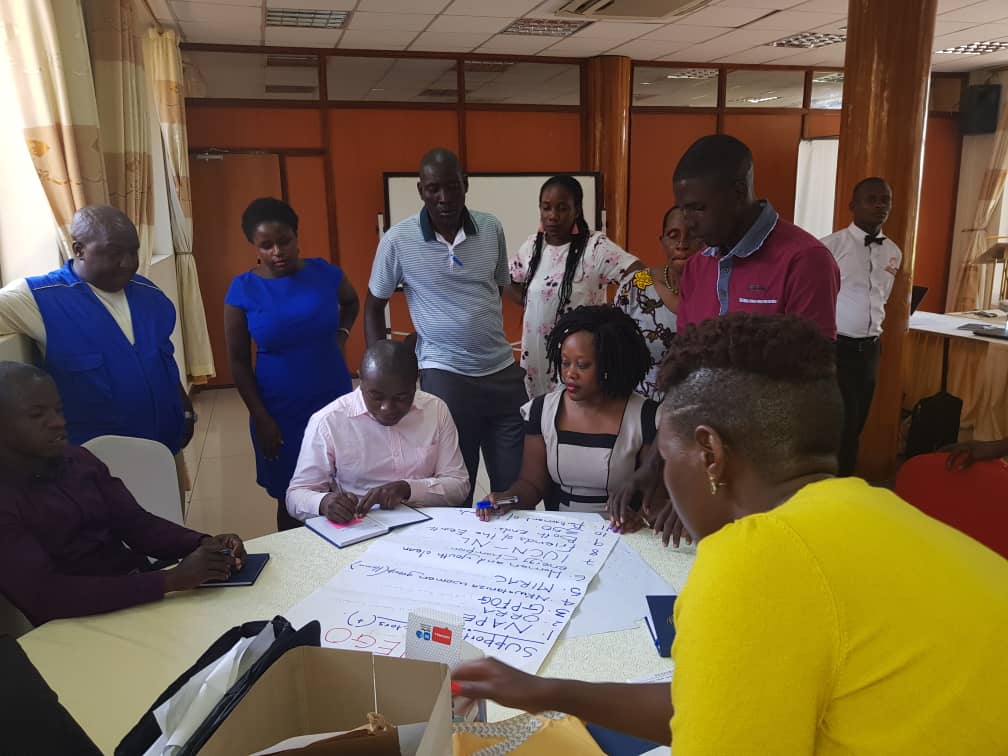
Five organizations working in the environment and extractives were present at the training that aimed at equipping participants with basic knowledge and skills on physical and digital security alongside empowering the participants to conduct security risk assessments and to identify strategies that would help them mitigate risks.
The workshop was inspired by a risk assessment done by DefendDefenders of the organizations that participated in the court case against Total for alleged human and environmental rights violations triggered by its operations in Uganda. Total is one of two operating companies of the Lake Albert Oil Project, together with China National Offshore Oil Corporation (CNOOC), and of the giant pipeline EACOP project., The risk assessment concluded the need to build the capacity of the organizations involved in order to ensure they are ready to prevent and respond to any security threats related to their work.
This comes a few weeks after a similar gathering organized by 350.org took place in Brazil that brought together climate defenders from 5 continents and 23 countries whose aim was to equip participants involved with similar skills and capacity related to safety, resilience and cross-regional solidarity.
Adentan Municipality contributes towards the 100% renewable energy in Ghana
‘Has anyone gone up North of Ghana? Some parts of our country are getting warmer and one of the objectives of the International communities is to reduce the earth’s overall temperature by 1.5 degrees, it is each of our responsibility to ensure we maintain Ghana’s NDCs and offer our contribution to solving the climate crisis” said Mr Foster Gyamfe of the Ministry of Finance Economic Strategy and Research division, at a workshop organized by 350 GROC at Adentan Municipal Assembly. Mrs Gifty Owusu - Nhyira of the Ecobank Ghana an accredited entity to the Green Climate Fund (GCF) lauded the initiative of the GROC Team “our doors are open to review and advise on any climate intervention projects from this workshop”
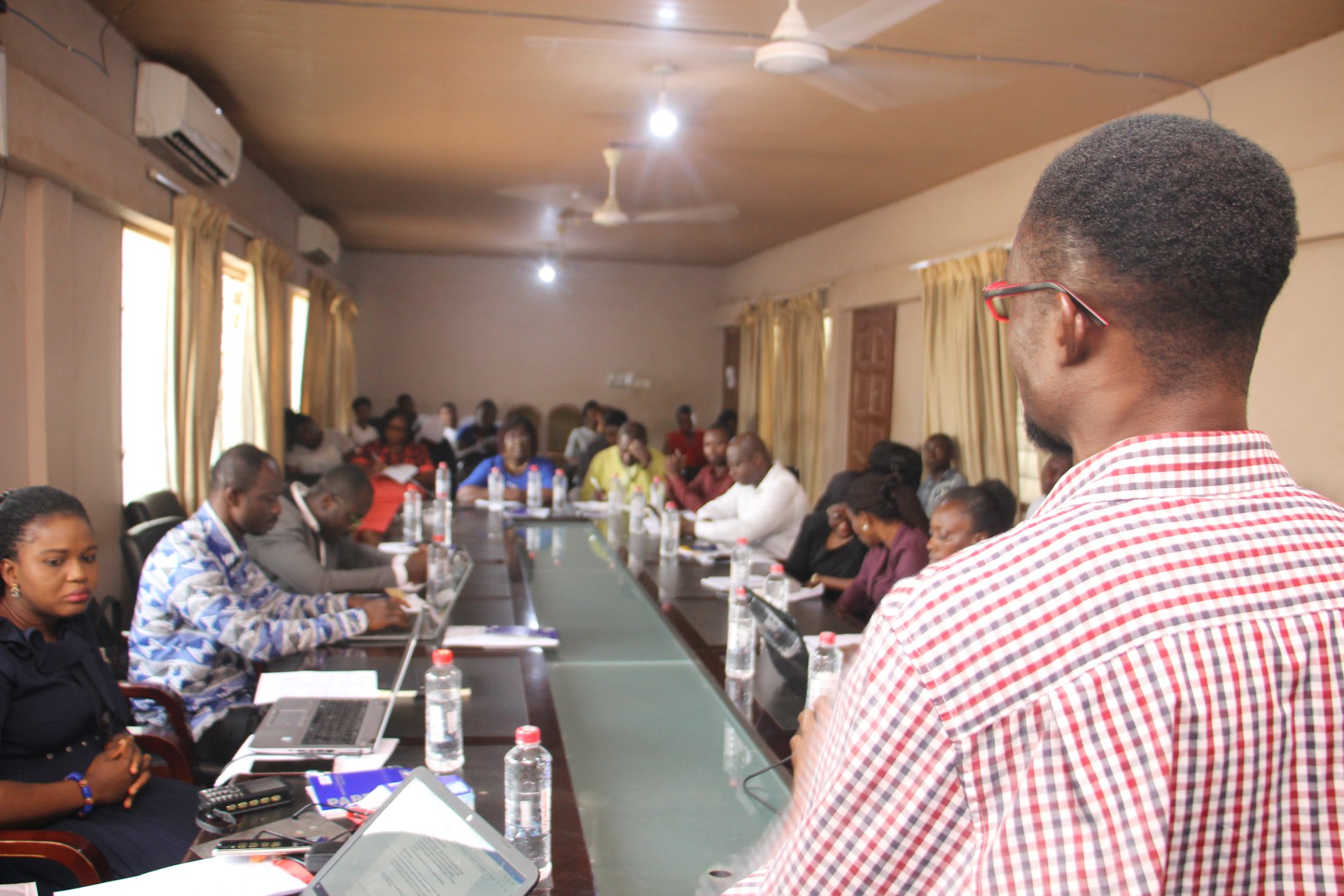
The workshop was held as part of the Renewable Energy for Communities (RE4C) campaign by 350 GROC and it brought together 40 participants, that is,25 members from the district and 15 partners. The workshop offered a space to discuss the present renewable energy plans in the Municipality, the failures and successes in the implementation of the pre-existing plans and finally the GROC team worked alongside the community to draft the renewable energy plan of the Adentan Municipality that is more viable.
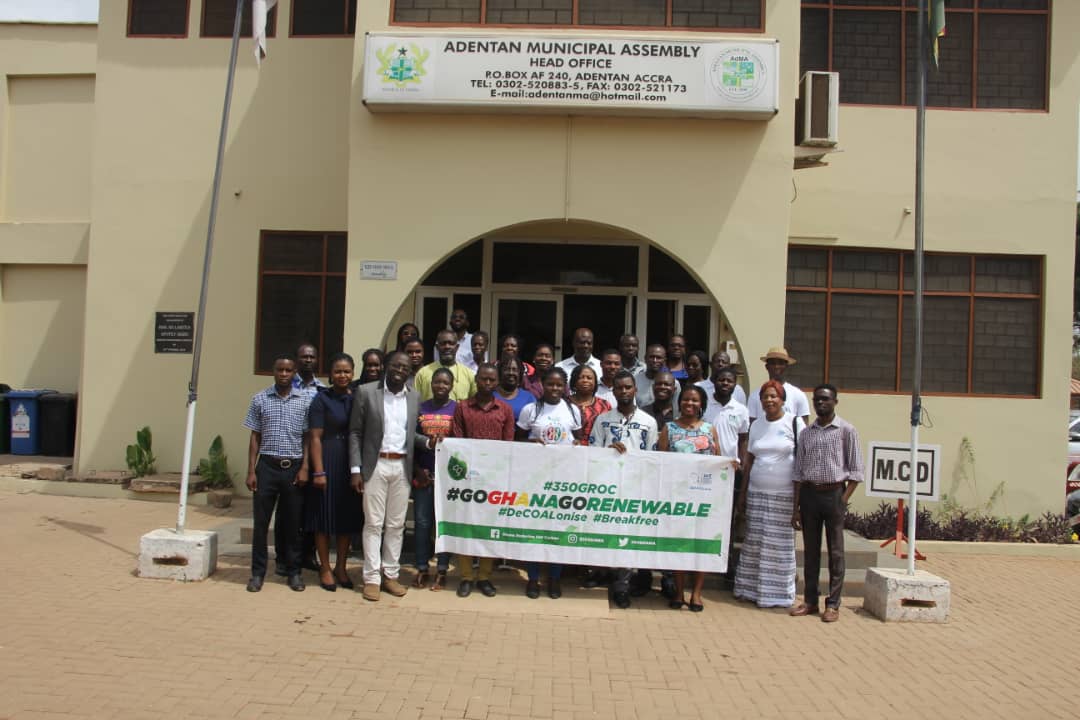
Adentan Municipality is amongst the 5 districts in Ghana that 350 GROC is working with for this phase of the Renewable Energy for Communities (RE4C) campaign. Success in the incorporation of the 5 district renewable energy plans in the existing Medium Term Development Plans, would be another milestone for 350 GROC after a long fight to stop the establishment of coal-fired power plants in Ghana, as it endeavours to promote nationwide renewable energy awareness geared towards sustainable development.
Kenya and Nigeria joined divestEd!
Divestment from fossil fuels has been gaining quite the momentum globally in the last few years. This week two youth groups in Kenya and Nigeria took action, joining the Fossil Fuel Divestment Day.
On 12th February, students in the Chiromo campus of the University of Nairobi, Kenya engaged in a 1-hour sit-in session. The forum attracted over 40 participants and took the form of a participatory dialogue to exchange on the need to invest in renewable energy in the campus, its advantages, as well as reaching out to other campuses to follow suit. The students, mostly drawn from the Chiromo Environmental Awareness Club and environmental scientists in the making had strong contributions on how renewable energy on campuses could look like, citing the need for academia and researchers to take a lead in implementing solutions to the fight against the climate crisis.
It happened! We are likely the first across the world to host the #divestED event owing to our special circumstances that could not allow us a quorum tomorrow.
Thanks for all students in @ceackenya who hosted us, and keenly contributed to the dialogue. @divesteddotorg pic.twitter.com/jn4zNNShp6
— Y-CEARE (@YCeare) February 12, 2020
Among the emerging issues was the need to have a strong legal requirement that enables campuses and institutions to have renewable energy systems as a part of them going green in energy production and usage. The action was led by Y-CEARE (Youth Coalition for Environmental Advocacy and Renewable Energy), a team part of AfrikaVuka.
In Nigeria, GIFSEP (Global Initiative on Food Security and Ecosystem Preservation) held a workshop on reducing carbon footprint, followed by a mock protest within the university of Abuja, targeting students from the department of geography and environmental management. The team intended to encourage the department to join the ongoing efforts to transition from fossil fuels addiction to renewable energy. Students specifically asked the university administration to switch to renewable energy and install solar panels on top of administrative and campuses blocs.
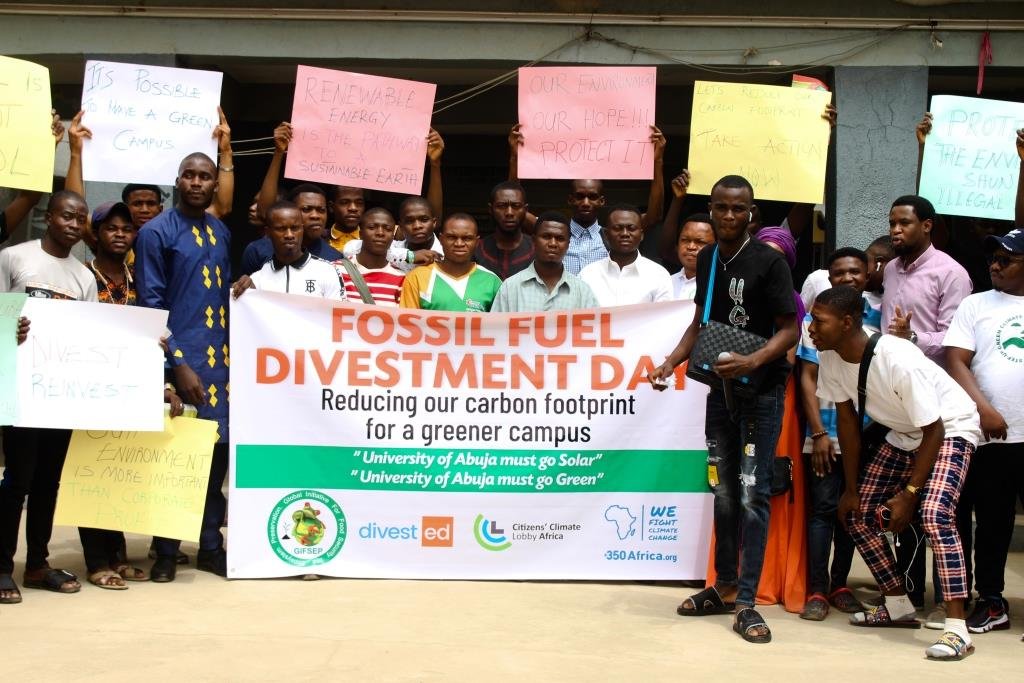
When asked about what to expect after this divestEd initiative, Joseph Ibrahim of GIFSEP said “We are still having issues of unstable electricity supply. We believe this initiative will inspire the students and the university to take on renewable energy and create an example for other campuses and schools and hopefully Nigeria as a whole. ”
I was at University of Abuja today to make a climate change presentation and joined the students to demand for a greener campus #F2D2 #FossilFuelDivestmentDay #Afrikavuka pic.twitter.com/0J1CMcunDl
— Joseph Ibrahim (@joeibro) February 13, 2020
Both teams joined the Fossil Fuel Divestment Day or divestEd, a mobilisation moment led by US divestment students to demand specific institutions to divest from fossil-fueled destruction of land, air, and water and re-invest in renewable energy.
Author: Rukiya Khamis, 350Africa.org Anglophone Field Organizer.
As climate talks start in Madrid, a people-centered vision for a fossil-free Africa is gaining ground
The climate crisis has been dominating the mainstream media lately. Every week, we hear about climate-related disasters hitting different regions across the world. At the same time scientists keep sounding the alarm about our diminishing ability to rein in the worst of climate change, activists keep protesting against climate inaction and corporations continue violating human rights.
As the UN and global leaders discuss climate change issues at COP25 - that is the 25th Conference of the Parties to the United Nations Framework Convention on Climate Change (UNFCCC) in Madrid, Spain, Africans are rising in ever-growing numbers to resist the fossil fuels industry and champion adapted and affordable climate solutions. Across Africa, civil society groups and local groups are fiercely working towards setting Africa free from coal, oil and gas dependency. Citizens and communities from Lamu (Kenya) to Bargny (Senegal) to Virunga (Democratic Republic of Congo) to San Pedro (Ivory Coast) and Mpumalanga (South Africa) are standing against big fossil fuel companies that are exacerbating the impacts of climate change. These struggles have felt the need to unite and work closely together under the AfrikaVuka platform to achieve greater results and impact. They deserve recognition, support and solidarity.
We cannot stand and watch our lives, economies, ecosystems and resources being put at risk without speaking out. We refuse to accept that our continent, vulnerable and already severely impacted by the effects of climate change, should become the dumping ground of a dying industry. We denounce and reject the rhetoric that coal companies bring ‘development’ and demand greater and active participation in the discussions on future energy choices. For millions of Africans, climate change continues to worsen inequalities at different levels. Supporting people affected irreversibly by climate change, strengthening adaptation mechanisms and addressing the issue of loss and damage are among other core issues being discussed in Madrid, issues which are the central parts of the Paris Agreement.
Four years ago, the Paris climate agreement was signed at COP21. It wasn’t a perfect agreement, but it was the best we’ve managed to get so far, and one that, if fully implemented, would give us a good chance to avoid the worst-case scenarios on the climate crisis. That agreement set a target to reduce global temperatures well below 2C and aiming for 1.5C. Since then, scientists produced a wealth of increasingly concerning reports and studies confirming how only keeping global temperatures from rising beyond 1.5C we will be able to avoid mass die-off of species, destruction of ecosystems and livelihoods and massive migrations as people are forced to flee their homes to seek refuge elsewhere.
Yet, national governments and other powerful actors have failed so far to deliver the sweeping policies and courageous decisions that would stop the world from burning up even further than it has so far. Emissions keep rising, investments in fossil fuels continue and the most vulnerable among us become more and more so by the minute. There are many reasons why this is happening, many reasons why governments are not acting according to what science dictates and what the people need. Apart from COP21, all other climate talks have often been characterised by hypocrisy, greed, empty promises and procrastination, with big polluters deliberately delaying and sabotaging any significant climate action. The influence of the fossil fuel lobby on our governments and on the climate talks themselves has made it so that real progress has been so far stalled, all to allow a few large corporations and national elites to prosper at the expense of everyone else.
We say “no more”
As the climate crisis escalates, African decision-makers must heed the call of the people and urgently take action by focusing on solutions that eliminate fossil fuels and transition to clean and sustainable energy. At the village, city, district and county levels, people are coming together to challenge the power of the fossil fuel industry. Unions, faith groups and non-environmental groups are joining them to build alternative people-centred solutions. With the continuous energy technology innovations making renewable energy more accessible and affordable, we believe that Africa can and must lead the way in this watershed moment in history, by addressing the climate crisis while creating a more just and equitable world and generating millions of new jobs for its growing youth population powered by technologically advanced renewable sources.
Regardless of the outcomes of the current climate talks in Madrid, the fight against climate change will not stop. It’s clear that a just and rapid transition away from fossil fuels is within reach, in Africa just as anywhere else. In fact, the way we deal with the climate crisis matters as much as how rapidly we act. We cannot expect the climate crisis to be meaningfully addressed unless those in power start taking into consideration other social justice issues such as extreme poverty, extraction, neo-colonialism, lack of freedom and inequality. We cannot see the climate crisis solved without putting at the center the very frontlines communities affected by recurrent floods, droughts, environmental destruction, hunger and forced displacement. COPs will continue to be a failure as long as the UN allows fossil fuel industry lobbyists to walk its halls and to influence complacent politicians not to take the strong action needed against what the UN secretary-general himself calls an “emergency”.
Landry Ninteretse is the Regional Team Leader of 350Africa.org.
UNESCO has a chance to protect Sundarbans. Will it?

Have you heard of the Sundarbans? On the southern coast of Bangladesh, this precious forested area is home to 4.5 million people and the royal Bengal tiger. It’s a place of immense cultural heritage, sustaining local fisher communities and livelihoods.
But something is wrong. Industrial development – coal in particular – is threatening the air, water, and climate for the people of the Sundarbans. Locals in the area, supported by the global Bangladeshi diaspora, have known about this and campaigned for protection for years. But new aerial footage showing the extent of the damage makes it undeniable – action is needed right now to protect the Sundarbans for good. Click this video to watch:
New satellite images show the proximity of Rampal coal plant area to Sundarbans Reserve Forest and Dolphin Sanctuaries. @UNESCO World Heritage Committee must stand up to coal and list Sundarbans as a heritage site in danger. https://t.co/ESPz8spnUV #SaveSundarbans pic.twitter.com/MLwc9rYHz6
— 350 South Asia (@350SouthAsia) July 1, 2019
In June, the International Union for Conservation of Nature, the official advisor on natural World Heritage recommended that UNESCO should list Sundarbans as a World Heritage Site in Danger. IUCN recommended placing the Sundarbans, the world’s largest mangrove forest on the endangered list due to numerous threats from coal plants and increased industrial activist in the region.
These recommendations came as the construction of the Rampal coal plant continued despite the World Heritage Committee in 2016 asking the Bangladesh government to cancel the Rampal coal plant. Additionally, two more coal plants are currently being developed on the Payra river, which flows on the same bay as the Sundarbans. Over 150 industrial projects are being developed upstream.
The recommendations of IUCN are being fiercely opposed by the Bangladeshi government– despite our current climate crisis and record heatwaves in the region last month.
UNESCO delegates are currently meeting in Baku, Azerbaijan - and they’re due for a decision on whether to add the Sundarbans to the list of Endangered Sites.
Now is our time to pile on the pressure. Bangladeshi activist Tonny Nowshin and Kenyan organiser Rukiyah are Baku right now to make sure UNESCO hears our message. You can follow them on Twitter and stay updated on the day’s happening at the UNESCO meeting in Baku, Azerbaijan.
As @UNESCO delegates meet in Baku, Azerbaijan this week @350 campaigners @Rukiya_Khamis & @t_nowshin are there to convince them to add the Sundarbans and Lamu in Kenya to their list of Endangered Sites https://t.co/btaOZtVyL4 Follow them for all the latest pic.twitter.com/GNrKAqOew0
— 350 dot org (@350) July 1, 2019
Show your support for the people of Bangladesh, Kenya and communities around the world facing down new coal developments! To tell UNESCO: Stop the coal plant, save the Sundarbans
Sign the petition to Save the Sundarbans
The Lamu Coal Plant project in Kenya has been stopped by a court decision
Our friends and allies in Kenya just won a tremendous victory -- the National Environment Tribunal (NET) of Kenya has cancelled the licence previously granted to Amu Power, the developer of the controversial Lamu Coal Plant.
After years of inspiring and creative campaigning from the climate movement, the Kenyan National Environment Tribunal (NET) has just cancelled that license, citing the lack of effective public participation and social and environmental risks among other reasons.
Petitioners from Lamu celebrating the NET judgment. National Environment Tribunal observed that public participation and EIA study are the oxygen in any project. And that they can't excuse non-compliance. #LamuCoalJudgment #deCOALonize pic.twitter.com/dn6xdfJfdz
— deCOALonize Kenya (@deCOALonize) June 26, 2019
This is a huge victory for the climate movement, environmental rights, for the Lamu community and for our planet. Join us in the celebration: watch and share this 1-min video on Facebook, Instagram, or Twitter and help the news spread far and wide!
This outcome proves once again that people power is unstoppable -- and that when we mobilise and fight, we win. From emails, social media shares to the creative protests and letter-writing campaigns we helped organize, from small and localised meetings to huge rallies, we pushed and pushed and didn’t give up, even in the face of intractable targets.
This momentous ruling is a major step toward a fossil free Kenya.
What the deCOALonize movement accomplished in Kenya is the kind of bold and visionary action that puts us on the offensive against the fossil fuel industry. We need more of this kind of action in Kenya and around the continent. .
Today, we take a moment to celebrate. And tomorrow, we get back to work. We’ll keep the pressure on our elected officials at all levels, and fight for our climate and safety of our communities. City by city, province by province, country by country we won’t stop working to build people power for bold action that matches the scale needed to avoid catastrophic climate impacts. Share the video on your social media to help spread the word about this milestone!
This unprecedented victory is proof that by collectively fighting for a more just and sustainable world, we’re able to defeat the devastating fossil fuel industry — and widen the horizon of the future we can create.
This victory is also a signal to every other governments, countries and multinational: Africa is not for sale. Together, we can start building a Fossil Free Africa.
PR: deCOALonize Campaign partners and Greenpeace Africa Demand a Stop to Coal Investments in Kenya.
Nairobi, 12 June 2019 – Communities from Lamu and Kitui together with Greenpeace Africa and members of the deCOALonize coalition have today handed over letters to the Ministry of Energy and the Chinese Embassy. The letters are calling on the Cabinet secretary, Hon. Charles Keter and Chinese corporations to stop investing in Lamu and Kitui coal projects and instead invest in renewable energy.
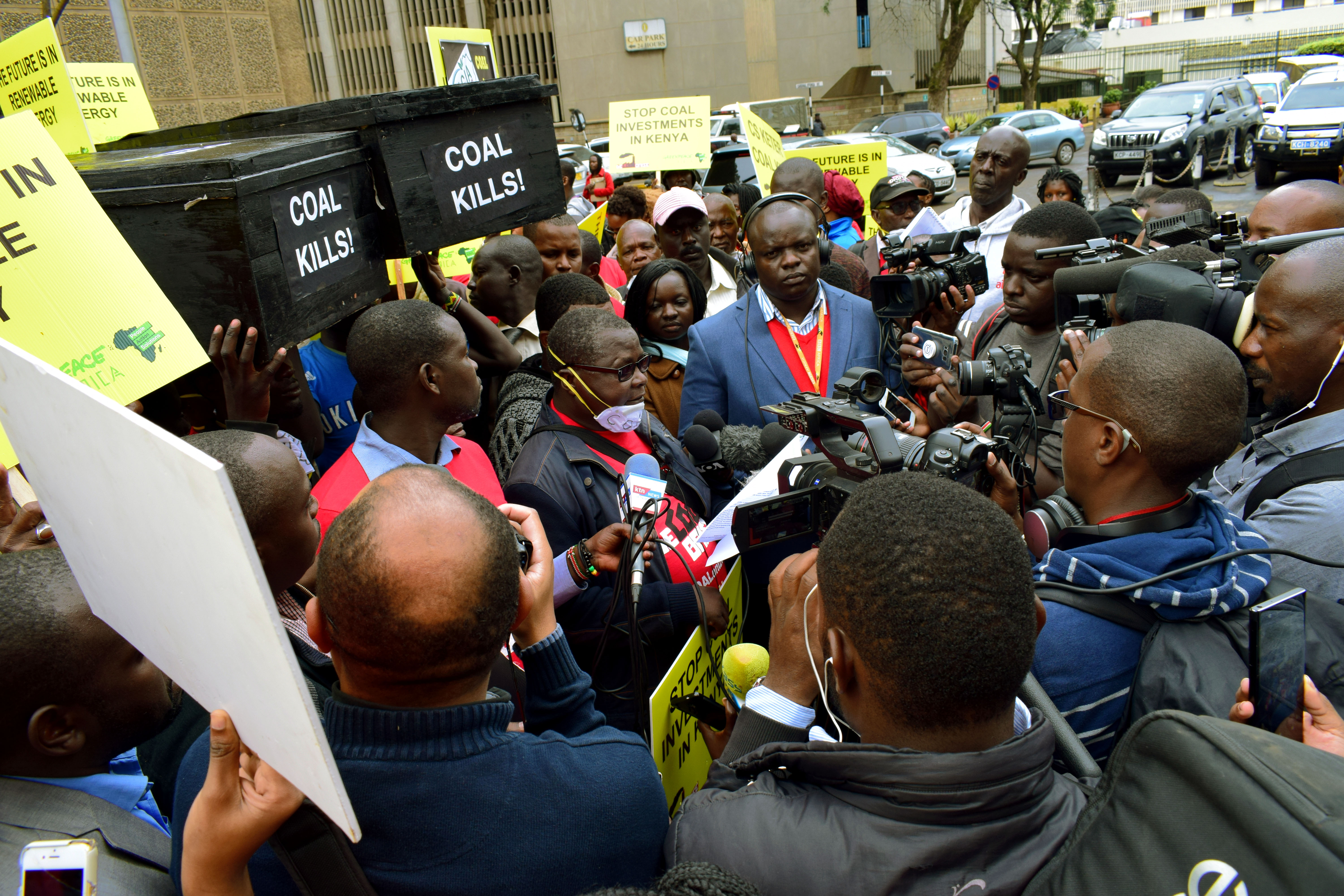
The anti-coal activists marched from Uhuru Park to Nyayo house where the Ministry of Energy is housed and then proceeded to the Chinese embassy to express their discontent over the planned Coal Power Plant in Lamu and coal mining in Kitui.
Coal burning is the number one source of air pollution worldwide. The true cost of coal is destruction at every step- damaging people’s health through air pollution, using up and polluting scarce water resources and contributing to the climate crisis. This coal project will also destroy mangrove forests and local livelihoods, in an ecologically rich area of Kenya - Lamu - which is recognised as a UNESCO World Heritage site.
“Our cultural heritage and livelihoods are threatened. The Lamu coal plant will ruin tourism and Lamu Old Town - destabilizing the county’s economy and the environment. Our people will face the most health risks from this plant. The government must prioritise the protection of local communities and the environment,” said Mohamed Mbwana From Save Lamu.
“There is no need to build centralized dirty sources of energy such as coal to answer to Kenya’s energy demands especially when the country is taking the lead in Africa with 85% renewable energy base. With access to wind, solar, geothermal and tidal energy sources, Kenya’s renewable energy potential is cost-efficient and causes no harm to the people and environment,” said deCOALonize Campaign Coordinator, Omar Elmawi.
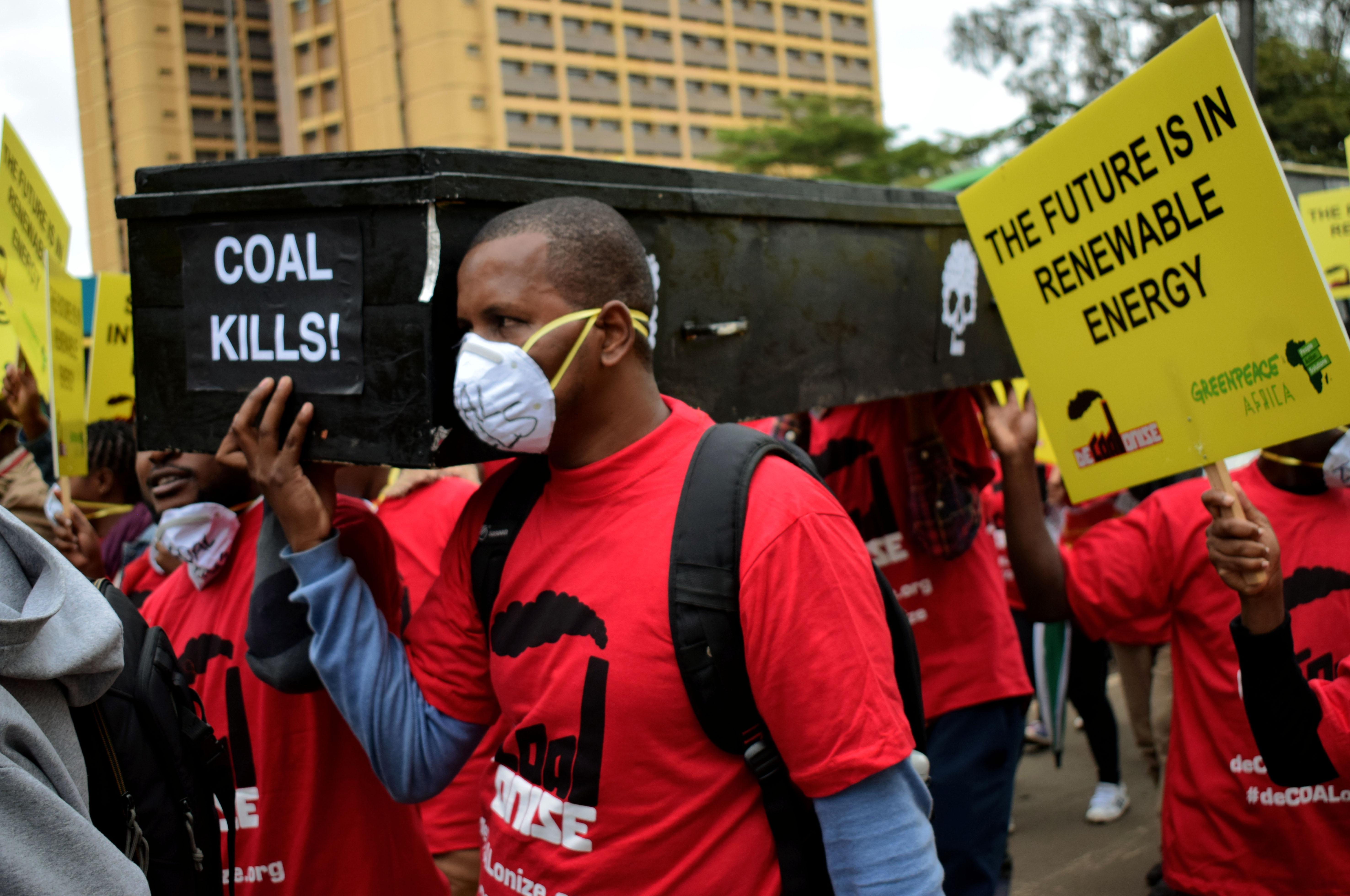
Climate crisis remains one of the biggest challenges facing humankind. Throughout the world, countries including China - directly linked to the project - are divesting from coal. Studies have shown that the social, environmental and economic costs of running coal-fired power plants exceed the benefits.
“Climate crisis has crippling effects on developing economies; fossils fuels such as coal exacerbates these effects. Kenya cannot afford to ignore this anymore. It's time to quit plans for dirty, highly polluting coal and invest in renewable energy,” said Greenpeace Africa’s Senior Political Advisor, Frederick Njehu.
Kenya currently produces more energy than it uses. However, electricity access to urban, peri-urban and rural communities is still limited due to a centralized energy system. Investing in a robust decentralized grid system will allow for better access to electricity to industries and households. Investments in the energy sector should go towards expanding the grid network.
Kenya’s president has committed to 100% renewable energy by 2020. Greenpeace Africa and deCOALonize in solidarity with the local communities in Lamu and Kitui would like to hold President Uhuru Kenyatta accountable to this commitment and call on him to halt all investments towards coal in Kenya.
Notes to the Editor:
● Open letter to the Chinese government
● Letter to Ministry of Energy
Media Contact:
- Hellen Dena, Greenpeace Africa’s
- Communication Officer, hdena@greenpeace.org, +254 717 104144
- Omar Elmawi, deCOALonize Campaign, omar.elmawi@decoalonize.org, +254710343432
Kenya doesn't need coal, Report reaffirms
A new report on the proposed Lamu coal plant in Kenya reveals that the project is a huge mistake in terms of investments, excessive power generation and electricity costs for consumers.
The report entitled The Proposed Lamu Coal Plant: The Wrong Choice for Kenya presented on the10th of June in Nairobi cautioned that the project would be ‘locking the country into a 25-year deal at a cost to consumers of more than US$9 billion, even if the plant never generates any power”.

Some of the highlights of the report which was compiled by the Institute for Energy Economics and Financial Analysis (IEEFA) include:
- Amu Power’s claims for the cost of Lamu-generated electricity are unrealistically low, based on outdated costs for the imported coal that will be burned and on overly optimistic assumptions about how much electricity the plant will generate.
- Using more realistic assumptions about future Lamu generation and coal costs, electricity from the plant could cost as much as 75 cents per kilowatt-hour (KWh), on average, during the years 2024 to 2037—more than 10 times what the plant’s proponents have claimed.
- This estimate does not include costs for port upgrades that would be required to bring coal to the plant, nor construction of the transmission infrastructure needed to distribute the power; the costs of these projects would add significantly to Lamu’s overall impact on electricity consumers and taxpayers.
The report also reaffirmed that the country doesn’t need any coal generation project, but should rather actively explore its abundant renewable resources to satisfy the likely growth scenarios.

Reacting to that release, the Kenyan government said it intends “to delay the Lamu coal-fired power plant to avoid a situation where Kenyans will end up paying for unused power if demand fails to keep up with the project’s output”.
“The coal plant will be built in the next four to five years as part of the Government strategy to delay new power over cost concerns’ said the Energy Principal Secretary Joseph Njoroge
This is a great move in this campaign which has been going on for over five years. Lamu residents, activists, scientists and other social justice groups had fiercely challenged the project, pointing out its numerous dangerous impacts in terms of people’s health, livelihoods and ecosystems.
Author: Rukiya Khamis.

